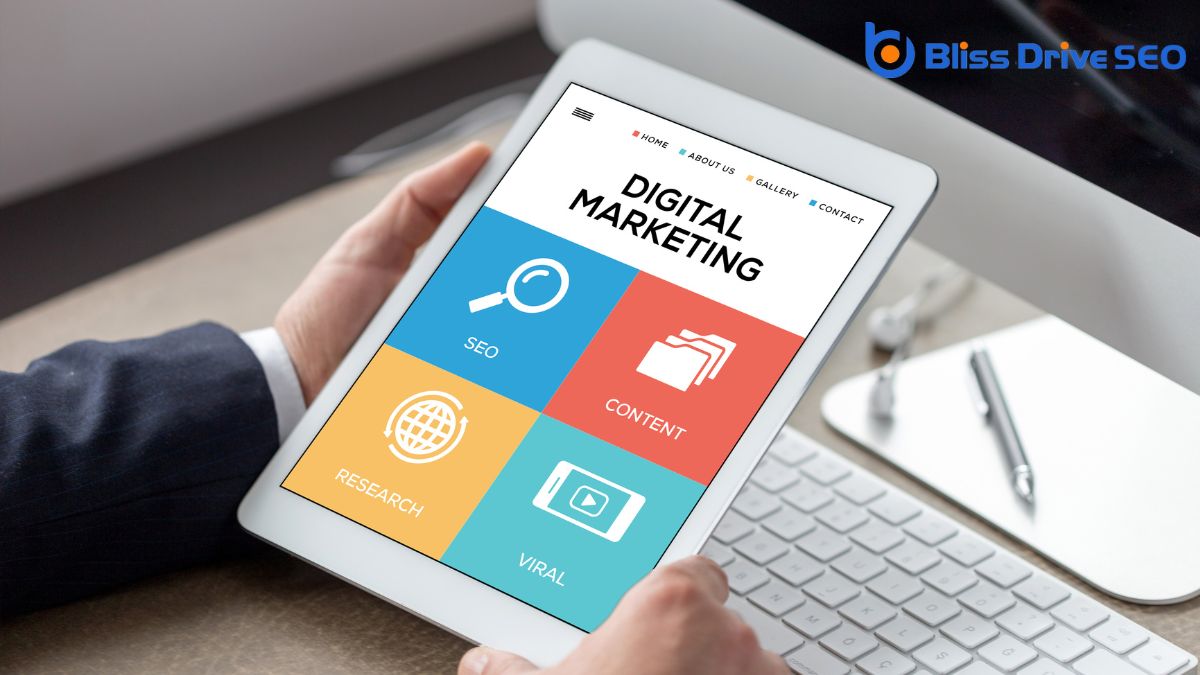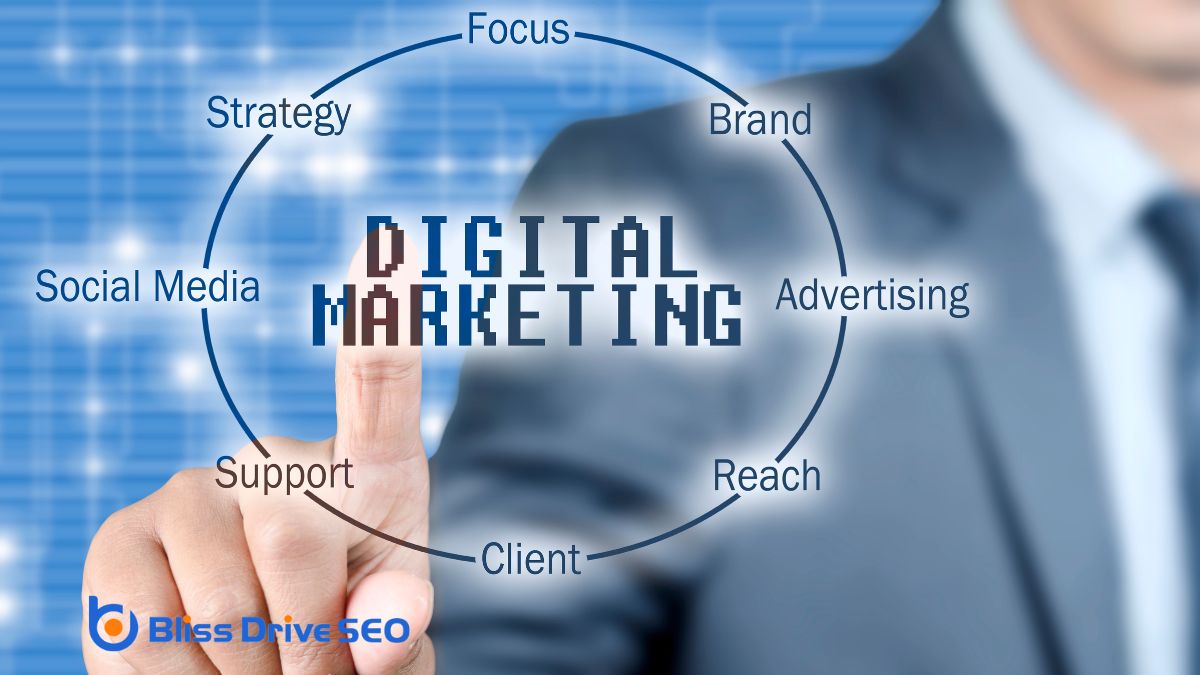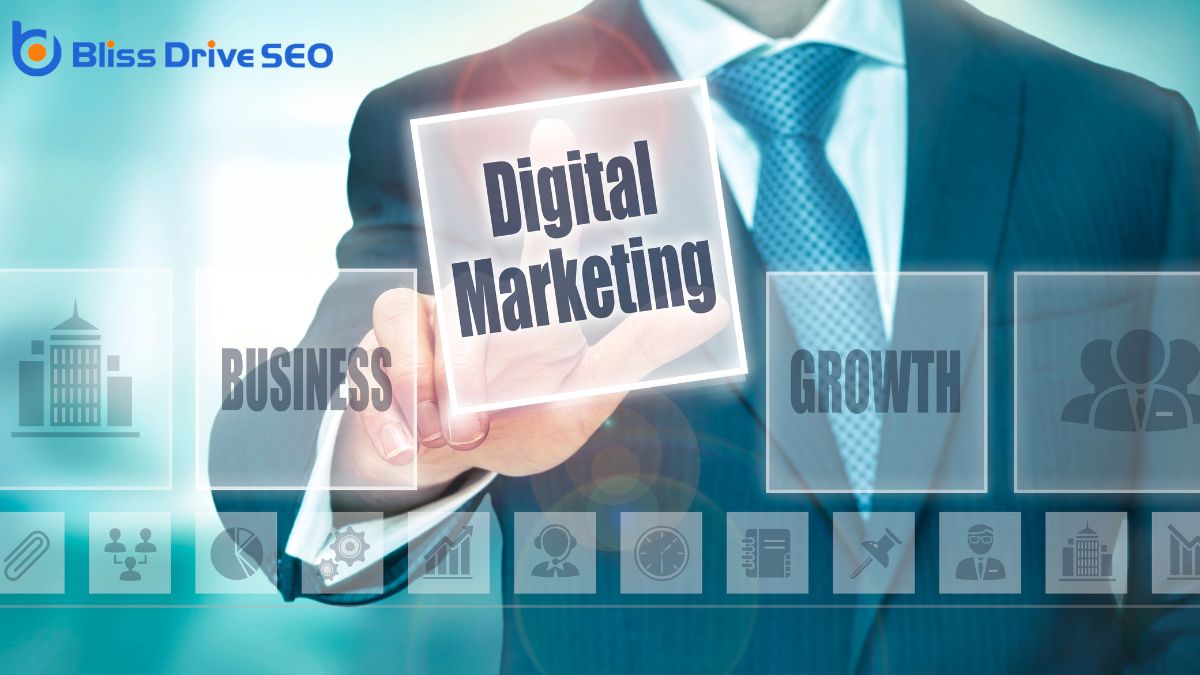Learn More About Us

Content marketingA strategic approach focused on creating and distributing valuable, relevant, and consistent content... isn't the same as digital marketing, though they often overlap. Digital marketing includes a broad range of online tactics, like SEO, social media, and email, aimed at connecting with customers quickly. On the other hand, content marketing focuses specifically on creating valuable content to build long-term relationships and trust with a targeted audience. While digital marketing seeks quicker conversions, content marketing nurtures a loyal following over time. Together, they enhance brand engagementThe level of interaction and emotional involvement consumers have with a brand. and visibility. Curious about how these strategies can shape your marketing success? There's more to uncover in this fascinating digital landscape.

In today's fast-moving digital era, defining digital marketing is vital for anyone looking to navigate the online business landscape. You've probably heard the term digital marketing mentioned, but understanding what it truly encompasses can make all the difference in your strategy.
In its simplest form, digital marketing refers to all marketing efforts that utilize the internet or electronic devices. This includes everything from social media and email campaigns to search engine optimization (SEO) and online advertising.
When you immerse yourself in digital marketing, you're exploring various channels that allow businesses to connect with customers online. Each channel has its unique approach, but they all share the goal of reaching and engaging potential customers where they spend a significant amount of their time.
For example, social media platforms like FacebookA social networking site where users can post comments, share photographs, and links to news or othe... and InstagramA photo and video-sharing social networking service owned by Facebook. enable you to interact directly with your audience, while email marketing lets you send personalized messages directly to people's inboxes.
It's important to recognize that digital marketing isn't just about selling products. It's about building relationships and trust with your audience. By understanding digital marketing, you can create strategies that not only promote your business but also provide genuine value to your customers.
In content marketing, your focus is on crafting key elements like compelling storiesA feature on platforms like Instagram and Facebook where users can post photos and videos that disap..., engaging visuals, and informative articles that captivate your audience.
You'll need to implement strategies that foster interaction, such as inviting feedback or encouraging shares.
Mastering the key content elements is vital for anyone looking to excel in content marketing. You need to focus on several critical aspects to guarantee your content resonates with your audience and achieves your marketing goals.
First, understand your audience deeply. You can't create effective content without knowing who you're speaking to. Identify their needs, preferences, and pain points, and tailor your content to address these areas.
Next, clarity and consistency in your messaging matter. Your content should convey a clear message aligned with your brand's voice and values. Consistent messaging builds trust and recognition over time.
Then, consider the format and medium. Different types of content, like blogs, videos, infographicsVisual representations of information, data, or knowledge intended to present complex information qu..., or podcastsAudio content distributed through digital channels, often in series format., serve distinct purposes and audiences. Choose the right format for your message and audience.
Additionally, strong headlines and introductions capture attention. They're often your first impressionWhen an ad is displayed on a user’s screen., so make them compelling and relevant.
Grasping key content elements sets the stage for crafting engaging strategies that pull your audience in and maintain their interest. To start, you should know your audience inside out. Identify their needs, interests, and pain points. This understanding lets you tailor content that speaks directly to them, making it more relatable and engaging.
Next, focus on storytelling. People connect with stories that evoke emotions or provide value. Create narratives that your audience can see themselves in, and you'll foster a deeper connection.
Use visuals wisely, as they can enhance engagement by breaking up text and providing an appealing way to convey your message.
Consistency is essential. Regularly publish high-quality content to build trust and keep your audience coming back for more. But don't just talk at them—engage in a dialogue. Encourage comments, ask questions, and respond promptly. This interaction not only boosts engagement but also strengthens relationships.
Lastly, analyze and adapt. Use analyticsThe systematic computational analysis of data or statistics to gain insights and support decision-ma... to track what's working and what's not. Adjust your strategies based on this data to continually improve and meet your audience's evolving needs. By doing so, you guarantee your content remains relevant and engaging.
When you immerse yourself in the world of content marketing and digital marketing, it's important to understand their key differences to effectively leverage each strategy.
Content marketing focuses on creating valuable, relevant content to attract and engage a specific audience, ultimately driving profitable customer actions. Its core is storytelling and providing information that speaks directly to your audience's needs, building trust and authority over time.
On the other hand, digital marketing is a broader umbrella that encompasses all marketing efforts using electronic devices or the Internet. It includes a wide range of tactics, such as social media marketing, email marketing, search engine optimization (SEO), and pay-per-click (PPC)An online advertising model where advertisers pay a fee each time their ad is clicked. advertising. Digital marketing's primary goal is to reach potential customers through diverse online channels, utilizing technology to analyze and optimize the effectiveness of these efforts.
While content marketing falls under the digital marketing category, it specifically emphasizes producing quality content. It's a long-term strategy that nurtures relationships with your audience.
In contrast, digital marketing often focuses on quicker, more direct methods to drive sales and conversions. Understanding these distinctions helps you choose the right approach for your business goals and audience engagement.
Exploring the intersection of content marketing and digital marketing reveals numerous overlapping strategies and tactics that can amplify your marketing efforts. Both approaches aim to engage your audience, build brand awareness, and drive conversions. By leveraging these shared techniques, you can create a more cohesive and effective marketing strategy.
Start with understanding that content marketing, a subset of digital marketing, focuses on creating valuable, relevant content to attract your target audience. When you combine it with digital marketing tactics like search engine optimization (SEO), social media promotion, and email marketing, you can enhance your content's reach and impact.
For instance, optimizing your blog posts for SEO increases their visibility, making them more likely to appear in search engine results.
Social media platforms also serve as a powerful tool where both strategies overlap. Sharing your content on social media not only promotes engagement but also helps build a community around your brand. Additionally, email marketing can be used to distribute content directly to your audience, ensuring they receive personalized and timely information.
While recognizing the overlap between content marketing and digital marketing strategies, it's important to spotlight the unique benefits content marketing brings to the table.
You'll find that content marketing focuses on creating valuable, relevant content that resonates with your audience. This approach builds trust and authority, establishing you as an expert in your field. By consistently delivering quality content, you foster a loyal audience that's more likely to engage with your brand and make informed purchase decisions.
Content marketing also enhances your visibility in search engines. When you produce optimized content, you're more likely to rank higher in search results, driving organic trafficVisitors who come to a website through unpaid search engine results. to your site without relying solely on paid advertisements.
Plus, content marketing is cost-effective. Creating and sharing high-quality content doesn't require a massive budget, yet it yields long-term results.
Moreover, content marketing promotes engagement and interaction. Encouraging your audience to comment, share, or discuss your content strengthens community bonds and extends your reach. You're not just talking to your audience; you're inviting them into a conversation.

Digital marketing opens up a world of opportunities for businesses looking to expand their reach and engage with a broader audience. By leveraging digital channels, you can tap into potential customers you mightn't reach through traditional means. With the power of the internet, you can create targeted campaigns that speak directly to your audience's needs and interests. This approach not only enhances your brand visibility but also drives conversions more effectively.
Consider these benefits of digital marketing:
Digital marketing empowers you to adapt quickly to changing trends and consumer behaviors. You can update your campaigns in real time, ensuring your strategies remain relevant and effective.
To achieve success, you should align your content and digital marketing strategies for cohesive growth. By integrating both approaches, you can enhance engagement and create a powerful synergy that resonates with your audience. This combination guarantees your message is consistent and impactful across all digital channels.
Integrating content marketing and digital marketing strategies can be a game-changer for your business's growth. By aligning these approaches, you create a cohesive plan that maximizes your reach and impact. When you strategically blend these methods, you're not just doubling your efforts; you're multiplying them. This synergy allows you to deliver consistent messages across multiple platforms, catering to the needs and preferences of your audience.
Consider these key points when aligning your strategies:
Achieving engagement synergy is crucial to maximizing the potential of your marketing efforts. By integrating content marketing with digital marketing, you create a powerful strategy that captivates your audience and encourages interaction. Start by aligning your content's message with the channels your audience uses most. This guarantees your message isn't only heard but resonates deeply, encouraging engagement.
To create this synergy, consider how each piece of content can be tailored for different digital platforms. For instance, a blog post can be condensed into social media snippets or transformed into a podcast episode. This approach not only diversifies your reach but also leverages the strengths of each platform, amplifying your message.
Don't forget the importance of feedback loops. Encourage your audience to share their thoughts and experiences through comments or reviews. This interaction provides valuable insights and makes your audience feel valued, boosting engagement and loyalty.
To sum up, you should recognize that while digital marketing and content marketing overlap, they aren't identical. Digital marketing encompasses a wide array of online strategies, whereas content marketing focuses specifically on creating valuable content to engage your audience. By integrating both approaches, you can maximize your reach and effectiveness. Embrace content marketing's storytelling power alongside digital marketing's diverse tools to create a cohesive strategy that drives success and growth for your brand.
